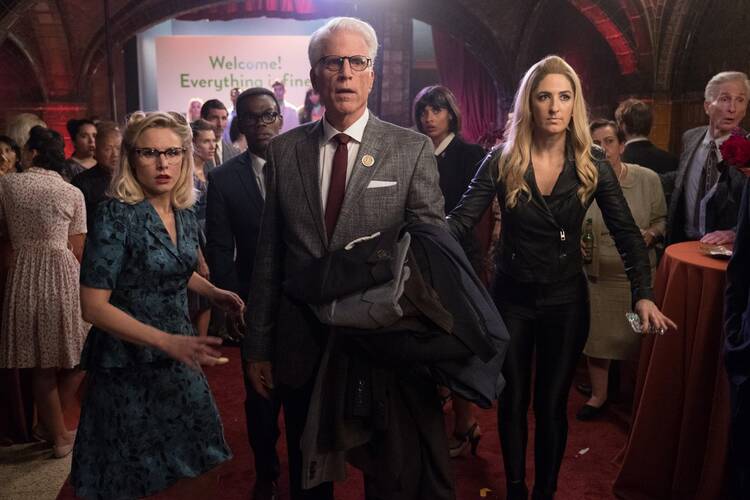Given the moment we are in, you might think a lot of shows on television would be trying to talk about current events or “America” in some way. But in point of fact, there aren’t that many. And even fewer are doing it well.
The most recent to enter the ring is “Here and Now,” HBO’s new show about a late-middle-aged liberal couple in crisis and their four semi-adult children, one of whom is haunted by the numbers “11:11.” (No, really.)
Although the show boasts an impressive cast—including Tim Robbins and Holly Hunter as the couple—and the “American Beauty” writer and “Six Feet Under” creator Alan Ball is at the helm, the show is worse than a mess: It’s boring. Imagine the depression of “The Leftovers,” but without the dramatic premise of the Sudden Departure that gave it depth and texture. Or “This Is Us,” but without whatever it is that keeps people watching “This Is Us” (a.k.a. their inertia and the taste of their tears).
While there are hints of a “Donnie Darko” secret-messiah scenario in the show’s premise, the main thing “Here and Now” insists on being “about” is America. The pilot episode builds to a moment when Greg Boatwright (Robbins), a philosophy professor, looks on the situation of the world today in light of the ideals of his youth and proclaims to the guests at his 60th birthday party, “We lost.”
Such words seem ready-made for viewers struggling with the current state of our union. Yet it comes off as self-indulgent and myopic, affluent white Baby Boomer liberalism in a locally sourced, no-preservative fortune cookie.
By far the strongest shows to take on America’s current moment are not cable dramas, political barnburners or family sitcoms, but science fiction and fantasy.
Case in point is “Star Trek: Discovery,” the CBS streaming-only show set 10 years before Kirk and Spock. “Discovery” immediately made a splash because of its film-fancy special effects and strong serialized storytelling. It is very much “Star Trek” for the modern age, a reimagination that avoids a tendency (found in some prior “Trek” series) toward moralizing and easy resolutions in favor of one sustained story about the crew of the U.S.S. Discovery dealing with the Federation’s scarily exploding war with the Klingon Empire.
As the season goes on, the essential insight of the story is that everyone has the capacity for great good or terrible evil. At first the Klingons are clearly portrayed as monsters, with pointy teeth and unmasked brutality. Yet halfway through the season the crew is thrown into an alternate dimension where the Federation is itself an empire of terror that enslaves, exterminates (and sometimes eats) non-human species. The longer our heroes are trapped there, the more they realize they are really not that different—a point made all the more clear when they return to their own dimension to discover the now-desperate Federation is contemplating genocide.
There is no “Donald Trump” figure in the show, no rhapsody about democracy. Lead character Michael Burnham does get a big speech in the season finale; but in a brilliant writing move, the main image she uses to describe the Federation, torch bearers of inspiration, is the same used by the central Klingon figure to describe her mission to her people. Your enemy is just another you.
The fantastic NBC show “The Good Place” has for two seasons taken similar ideas even further: Our leads first think they have died and gone to Heaven, but in fact they are all in Hell (and not by mistake).
What saves those characters in “The Good Place”—and the demon tormenting them, and his Alexa-like assistant Janet—is their willingness to help each other. Jean-Paul Sartre famously wrote that hell was other people; “The Good Place” insists, “No, Jean-Paul, hell is what happens when you insist on going it alone.” (Also, is it Jean or Paul? Make up your forking mind.)
Lastly, there’s “Marvel’s Agents of S.H.I.E.L.D.” on ABC, which has spent this season dealing with the revelation that sometime in the near future the Earth will be blown to rocky chunks, and it will be the fault of our heroes. Apparently at some point they will become so focused on saving one of their own, they will unintentionally doom the planet. It is a strong but softly played metaphor that speaks not only to the perils of climate change (sorry, future generations!), but to the nationalism, tribalism and party-centered politics that prioritizes winning over getting anything done.
In the end, each of these shows seems to say it is not some monster “out there” that should worry us most, but ourselves.
Social change is possible; it is striking, in fact, that for as dark as some of these shows get, most are also redolent with hope. But understanding our current moment requires fewer mopey tirades at birthday parties and more steady looks in the mirror.











What is true in our country is also true in our Church.
Only if we educate and inform ourselves, only if we care about those treated wrong within our Democracy or Church, will our Church or Country become great, and the vehicles thru which Jesus Christ can change our world into the Kingdom of Heaven.